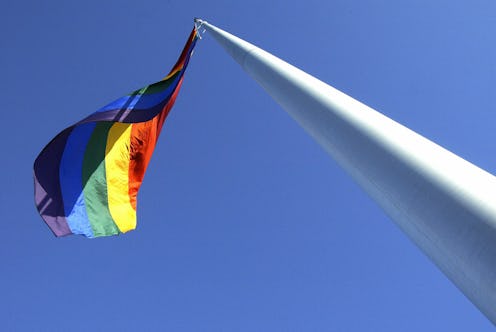There's a new clinic in Washington, D.C. that specifically caters to health issues of LGBTQ youth. The Youth Pride Clinic, a division of the Children's National Health System, creates a safe space for LGBTQ youth to receive medical care and treatment — a place where they are free from the stigma, discrimination, or general discomfort LGBTQ youth and young adults might otherwise feel interacting with a regular physician. The clinic is part of the hospital's adolescent center, which will now operate as the Youth Pride Clinic on Tuesdays, Wednesdays, and Thursdays for LGBTQ people age 12 to 22. LGBTQ youth are more likely to confide in and feel comfortable with their doctors when they know that there's a space for their needs to specifically be met; the clinic's three physicians and four nurse practicioners will provide that space.
In Washington D.C., about 16 percent of youth identify as gay, lesbian, bisexual, or questioning, according to the District of Columbia Youth Risk Behavior Survey — a percentage which is higher than the national average. Sultan Shakir, the executive director of an advocacy group called Supporting and Mentoring Youth Advocates and Leaders, told The Washington Times that when LGBTQ youth don't receive proper care from medical facilities or education from their schools, they turn to the Internet. Given that the Internet often contains incorrect information... well, you can see how important it is for LGBTQ youths to have a place like the Youth Pride Clinic available to them.
There are a number of health issues that disproportionately affect LGBTQ youth which the Youth Pride Clinic will hopefully address. For example:
1. LGBTQ Youth Are Two to Three Times More Likely To Attempt Suicide
Though it's hard to qualify exactly what it is that drives people to complete suicide, LGBTQ youth are significantly more likely to face bullying, discrimination, issues with self-acceptance and/or acceptance from adults (including parents, relatives, and teachers), and lack of resources. These things could all be contributors to the issue.
2. Lesbians Are Less Likely to Get Preventative Services For Cancer
According to the Institute of Medicine Report: The Health of Lesbian, Gay, Bisexual and Transgender People, lesbians are less likely to get appropriate preventative services for cancer, like the HPV vaccine.
3. Trans Individuals Face Tremendous Amounts of Discrimination in the Medical World
Trans people have a high prevalence of HIV and other STIs, victimization and discrimination, and mental health issues. Unfortunately, they are less likely to have health insurance than heterosexual or LGB individuals because of discriminatory policies from employers and health insurance companies.
4. Elderly LGBTQ Individuals Face Additional Health Barriers
Because of isolation, non-inclusive healthcare policies, and non-existent social services, elderly LGBTQ people often have an incredibly difficult time finding medical help or communities.
5. LGBTQ People Are More At-Risk For Tobacco, Drug, and Alcohol Use
In fact, LGBTQ populations have the highest rates of substance abuse.
These are just a few among many issues LGBTQ people face due to both lack of resources and healthcare and systemic discrimination. Although we have a long way to go to ensure prevention of violence towards LGBTQ communities, effective care for the LGBTQ elderly, coaching and resources for parents and teachers, and all the other measures that need to be taken to not prevent members of the community, the Youth Pride Clinic is still a fantastic move forward. Everyone deserves to have access to healthcare and safe spaces where they can reach out and get help when needed.
